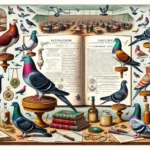Pigeons, like all living creatures, require proper hydration to maintain their health and well-being. Adequate hydration is crucial for pigeons to regulate body temperature, digest food, and maintain organ health. In this article, we will explore the importance of hydration for pigeons and discuss various aspects related to pigeon hydration.
Key Takeaways
- Pigeons need regular access to clean and fresh water for proper hydration.
- Dehydration can lead to various health issues and can be especially dangerous during hot weather.
- Pigeons have a high metabolic rate and require sufficient water intake to support their bodily functions.
- Monitoring pigeon hydration levels is crucial, particularly during times of increased water loss.
- Pigeon drinkers play a vital role in maintaining hydration levels and promoting overall well-being.
Water Requirements for Pigeons
Pigeons typically drink water multiple times a day to meet their hydration needs. These birds have a high metabolic rate, requiring sufficient water intake to support their bodily functions. The frequency at which pigeons drink water can vary depending on weather conditions, food availability, and other factors.
It is essential to provide clean and fresh water sources for pigeons to maintain proper bodily functions. Regularly changing the water and ensuring it is free from contaminants is crucial for their well-being. Pigeons can drink water from shallow dishes or birdbaths, as long as they have easy access to the water source.
Signs of Dehydration in Pigeons
Dehydration can have serious consequences for pigeons. It is important to recognize the signs of dehydration in pigeons to take prompt action. Common signs of dehydration in pigeons include:
- Weakness
- Loss of appetite
- Decreased activity
- Sunken eyes
- Dry and tacky mucous membranes
- Poor feather quality
If you observe any of these signs in a pigeon, it is crucial to provide access to clean and fresh water immediately. Severe cases of dehydration may require the assistance of an avian veterinarian.
Promoting Hydration in Pigeons
There are several strategies you can employ to promote hydration in pigeons:
- Provide clean and fresh water at all times: Ensure pigeons have access to clean and fresh water sources. Regularly change the water to prevent contamination.
- Use pigeon drinkers: Pigeon drinkers, such as shallow dishes or birdbaths, can provide a convenient and accessible water source for pigeons.
- Monitor hydration levels: Pay close attention to any changes in behavior or appearance that may indicate dehydration. Monitor the water intake and urine output of pigeons to ensure they are adequately hydrated.
- Offer water during hot weather: During hot weather or times of high temperatures, pigeons may require additional water to stay hydrated. Consider providing shaded areas and cool water sources to help them cope with the heat.
- Provide electrolyte supplements: In certain situations, such as racing or periods of extreme heat and stress, electrolyte supplements can help replenish essential minerals and promote hydration in pigeons. Consult with a veterinarian for appropriate supplements and dosages.
By implementing these strategies, you can ensure that your pigeons maintain proper hydration levels, leading to better overall health and well-being.
Conclusion
Hydration is vital for the health and well-being of pigeons. Regular access to clean and fresh water is essential for pigeons to regulate body temperature, digest food, and maintain organ health. Monitoring hydration levels and providing adequate water sources are crucial for their overall well-being. By promoting proper hydration, you can help ensure that your pigeons stay healthy and thrive.









